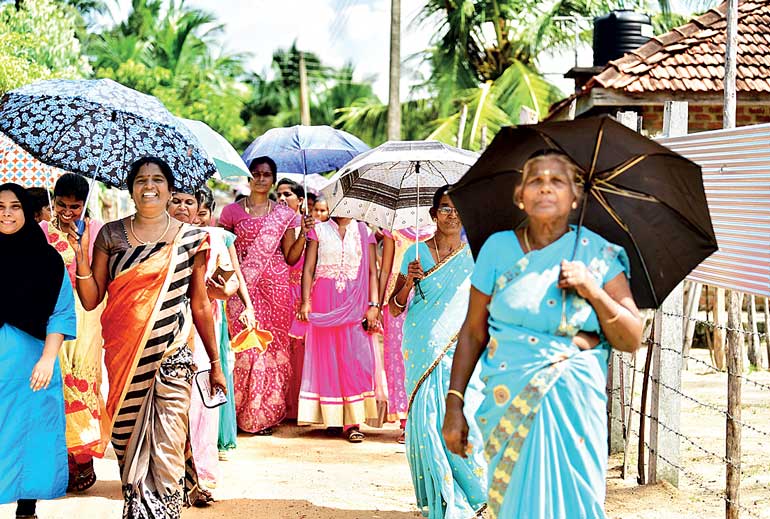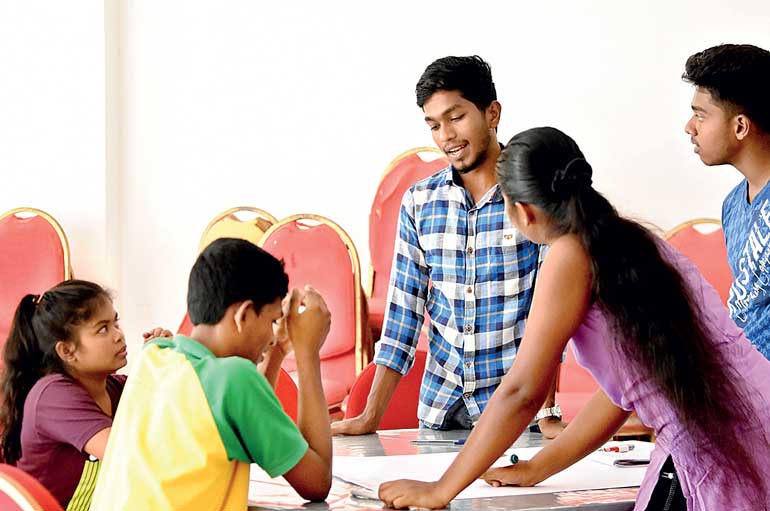Saturday Feb 21, 2026
Saturday Feb 21, 2026
Tuesday, 31 August 2021 00:45 - - {{hitsCtrl.values.hits}}


Highlights from the initiative
The Foundation for Innovative Social Development (FISD) in collaboration with the British Council, spearheaded the ‘Future without Violence’ project, with the aim of addressing harmful gender norms that lead towards Sexual and Gender Based Violence (SGBV) and cyber sexual violence perpetrated against women and girls.
This initiative is a follow up to the project ‘Empowering Communities to address Violence against Women and Girls (VAWG)’ which was implemented from 2018 to 2020 by FISD and British Council in partnership with Jaffna Social Action Center (JSAC), Janathakshan, and Hashtag Generation. A key output of the project is a survey on cyber violence among Sri Lankan youth, where the key findings and recommendations are fed into an action plan to address issues identified.
Under both projects, British Council, FISD and partner organisations conducted leadership and training programmes in five districts including Jaffna, Monaragala, Hambantota, Colombo, and Anuradhapura. A key objective of the project was strengthening service responses to survivors and victims of sexual and gender-based violence, foster gender-responsive communications and develop recommendations for advocacy-level action based on addressing gender norms that justify such incidents of violence.
While sexual and gender based violence has long been a hidden ‘epidemic’ in Sri Lanka, recent developments such as the COVID-19 pandemic have not only exposed the gravity of this issue but have also caused an increase in reported cases of domestic and intimate-partner violence, among others. One of the main reasons for the rise in sexual harassments, domestic violence and cyber violence is the increased use of the online space for learning and interactions.
The situation was further exacerbated as the country went on lockdown with many victims and survivors facing increased vulnerability of being trapped at home by their abusers. Restrictions placed on travel and mobility further hindered victims from seeking support. Additionally in an effort to understand the gender norms that drive violence, FISD conducted community mappings in selected villages from Hambantota, Monaragala and Anuradhapura as well as a spot survey on cyber violence among the youth to gauge knowledge and attitudes regarding cyber violence.
A few suggestions to minimise cyber violence as suggested by the FISD include creating awareness about possible cyber violence scenarios, educating youth on how to report, and increasing digital literacy at an overall level.
The British Council supports and advocates community-based initiatives, which prioritise gender sensitive empowerment programs through its English, Education, Arts, and culture work strands for more open and inclusive societies. Through this project, the British Council Sri Lanka collaborated with civil society partners and youth networks to upscale the talents of women and girls, supporting economic growth, and building networks to support women and girls in Batticaloa, Hambantota, Jaffna and Monaragala districts.
British Council Sri Lanka continues to collaborate with a wide network of public, private, non-profit, and non-governmental organisations on projects with great social impact. To date, through the collaboration with FISD and its implementing partners on empowering communities to address VAWG and ‘A Future without Violence’ projects – both women and youth from more than 20 communities actively participated in a journey where they learned to analyse the problem, plan and mobilise their communities to implement interventions.
Our current and future programs focus on reducing violence, creating role models, and tackling social media harassment through community-based interventions, as well as, raising awareness and stimulating attitude change through providing a voice, a choice and agency for female empowerment and change.